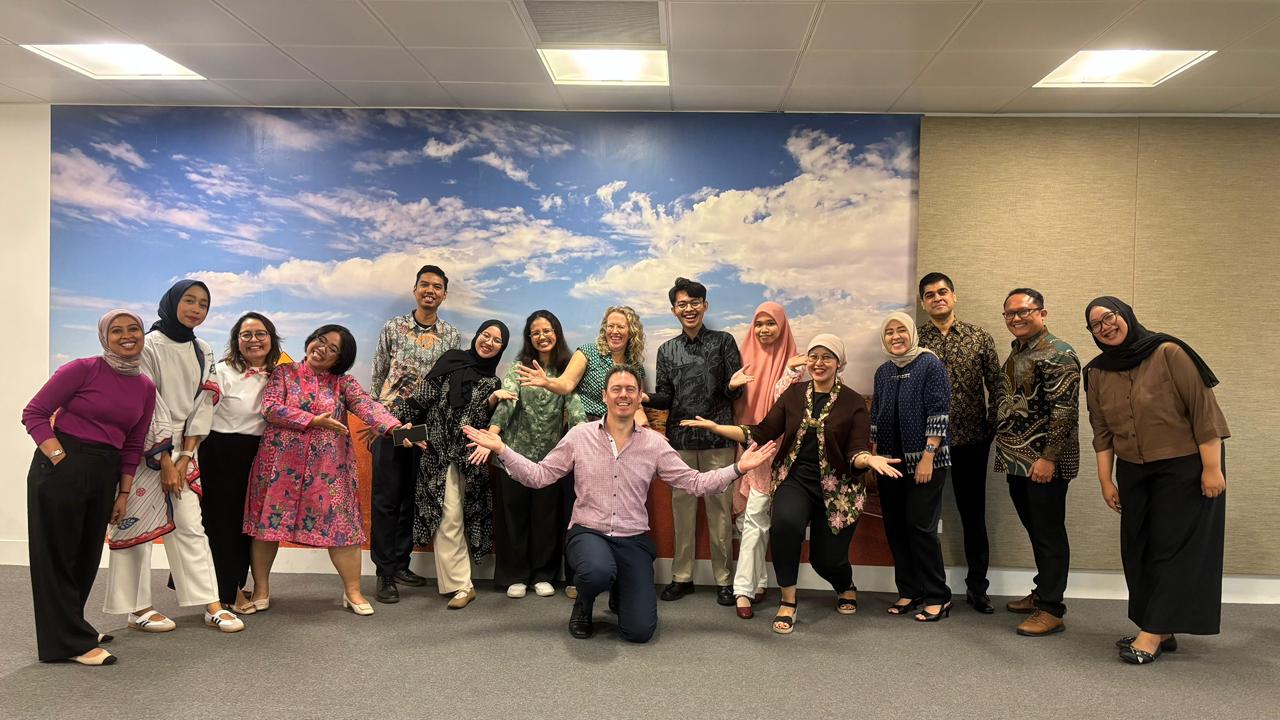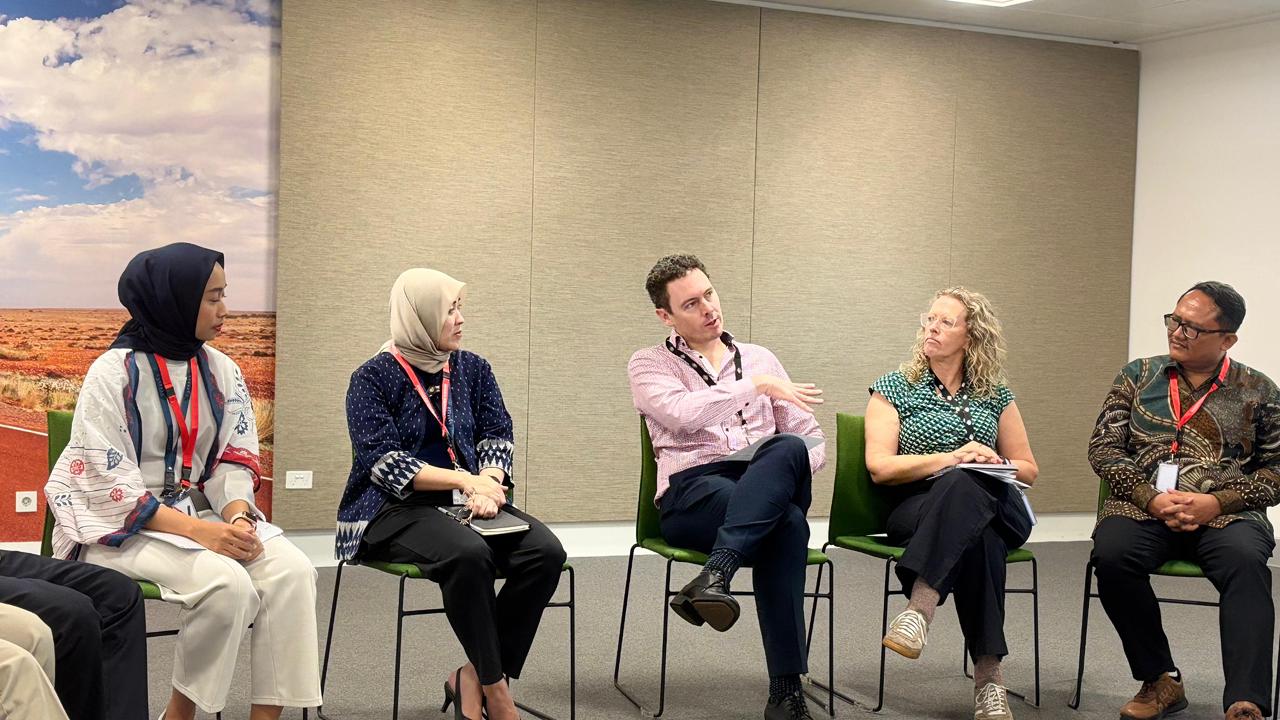SKALA Internship: Preparing Young Talents for Inclusive Development Partnerships

Dara Callista Amanda never imagined that she would be selected for SKALA’s internship program. As a person with low vision and physical disabilities, she had the opportunity to learn firsthand how disability-inclusive principles are integrated into policy making processes.
“This internship has given me insights into how civil society networks operate and engage with the North Kalimantan Provincial Government,” she said.
Dara is one of seven participants in the third cohort of the SKALA internship program, which runs from May to July 2025. Selected from a pool of 805 applicants – university students and recent graduates from across Indonesia – they were chosen through a competitive selection process. Five participants are placed in Jakarta, one in Maluku, and one in North Kalimantan. Now in its second year, the internship program continues to attract growing interest, with 506 applicants in the first cohort, 707 in the second, and the highest number to date in the current cohort.
On Thursday, 24 June 2025, all seven participated in a hybrid sharing session facilitated by SKALA to engage directly with the Australian Embassy team in Jakarta. The interns were welcomed by Minister Counsellor for Governance and Human Development Tim Stapleton, along with Acting Counsellor Sophie Roden and Unit Lead for Decentralised Governance Astrid Kartika. The session offered the interns a valuable opportunity to ask meaningful questions, gain insights into Australia–Indonesia’s long-standing partnerships and consider how these experiences could inform their future contributions to bilateral cooperation.
Diplomacy Starts at the Doorstep
The two-hour session focused on two key topics: the importance of the Australia–Indonesia partnership and the skills and expertise that interns can develop. The interns were curious about the Australia – Indonesia bilateral partnership through international development programs, and how this support benefits both countries. In response, Minister Counsellor Tim Stapleton emphasised the geographical proximity and shared interests in the Asia-Pacific region that make the Australia-Indonesia partnership highly strategic.
“Indonesia is on our doorstep, and as a neighbour, Australia wants Indonesia to succeed. Our interest lies in ensuring that this region remain stable and prosperous. We can achieve this through partnerships with all stakeholders, including the governments and civil society organisations,” he said.
Through SKALA Program, for example, the Australian Government works with the Indonesian national and subnational governments to promote more effective, evidence-based, and inclusive governance. The Minister Counsellor emphasised that this collaborative approach has gradually become a defining feature of the partnership between the two countries.
“Historically, aid was delivered through a donor-recipient model, but that’s changing for Australia and Indonesia. We are increasingly doing things jointly. SKALA Program, for example, is designed together with central and provincial governments, which require a more sophisticated way of working that we usually don’t use in other countries,” he added.
A Multidisciplinary, Inclusive Space for All Minds
In the session, Astrid Kartika and her team from the Decentralised Governance Unit openly shared the skills and expertise needed to get into the international development sector. Astrid has been traversing the sector for more than two decades. Her entry to the international development sector is a coalescence of opportunity, passion, and willingness to try. Her broad experience working for the United Nations agencies and then the Australian Embassy showed her the multidisciplinary nature of the sector. This is a boon that interns can benefit from when charting out their future careers.
“International development is a multidisciplinary space where people from different backgrounds weigh in and share their expertise and passion. There are multiple elements in the management and delivery of international development programs. For example, the Operations Team, which is the backbone of program delivery, requires various skills set such as IT, finance, HR, and procurement. Without them, programs simply cannot run. This space is open to all graduates, as long as they are committed,” she said.
Understanding community and local context is another valuable soft skill for interns. In the discussion session, participants were encouraged to observe how programs unfold on the ground. This helps them develop more nuanced perspectives and create solutions based on real-world experience, not just theory. Seven SKALA interns described the internship as a glimpse into how real-world diplomacy works and what it takes to turn inclusive development into reality. Atika Aulia Adharini, placed in Maluku, gained a deeper understanding of bureaucratic complexities. Salsabilla Aulia, an Information Systems student interning with the Knowledge Management team, saw how multidisciplinary skills supported by technology can be applied to strengthen government efforts and ultimately make an impact on communities. Despite their different backgrounds and perspectives, all seven interns walked away with a shared lesson. As Ihsan Hidayat, an intern with the Public Financial Management team, put it:
“What matters most is adaptability, a willingness to continuously learn, and the humility to never assume that we know everything.”
Through these seven young talents, the Australian Government – through SKALA – is investing in a future workforce that’s not only skilled but also aware of the importance of inclusion. They’re also part of a new generation of leaders who can help drive sustainable development in the years to come.








